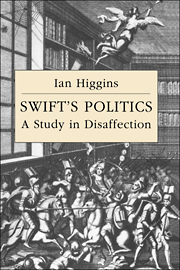Book contents
- Frontmatter
- Contents
- Preface
- List of abbreviations
- 1 Swift's political character
- 2 Revolution, reaction and literary representation: Swift's Jacobite Tory contexts
- 3 The politics of A Tale of a Tub
- 4 The politics of Gulliver's Travels
- Bibliography
- Index
- Cambridge Studies in Eighteenth-Century English Literature and Thought
- Frontmatter
- Contents
- Preface
- List of abbreviations
- 1 Swift's political character
- 2 Revolution, reaction and literary representation: Swift's Jacobite Tory contexts
- 3 The politics of A Tale of a Tub
- 4 The politics of Gulliver's Travels
- Bibliography
- Index
- Cambridge Studies in Eighteenth-Century English Literature and Thought
Summary
This contextualist study is concerned with the contested critical question of Jonathan Swift's political character. Attending to topical polemical circumstances the historical criticism in this book attempts to recover the partisan meanings of Swift's texts and their original political impact. This study offers a reassessment of Swift's political writing and recorded opinion. While contesting current conceptions of Swift as a Whig, it offers a partial revision of that scholarship which describes Swift as a non-Jacobite Tory. Swift's first readers claimed he was a disaffected High Churchman. Swift did not subscribe to traditional royalist Tory principles of absolute, divine-right monarchy and indefeasible hereditary succession, yet his Whig adversaries came to regard him as ‘a great Jacobite’. The question of Swift's ‘Jacobitism’ has been often canvassed in modern Swift studies and it is the scholarly orthodoxy that Swift was not a Jacobite. In constructing the author of A Tale of a Tub and Gulliver's Travels as a Whig or as a loyal Tory, modern scholarship has occluded a militant polemical strain in his great satires, poems and pamphleteering on affairs of state. Whether or not Swift was a Jacobite cannot be determined. He claimed in private and in print to be a Whig. Rather than dismiss the judgement of Swift's contemporaries, however, this study asks whether there is anything about Swift's political writing in polemical context that could have led contemporaries to construe Jacobite Tory meanings. The consonance of Swift's political rhetoric with Tory and Jacobite polemic is registered here.
- Type
- Chapter
- Information
- Swift's PoliticsA Study in Disaffection, pp. ix - xiPublisher: Cambridge University PressPrint publication year: 1994

